|

Thoroughly Enjoyable
An Arizona winter treat of Verdi's 'Aida',
enjoyed by MARIA NOCKIN
Egyptian Khedive Ismael Pasha wanted to join European countries in the nineteenth century culture competition. He had been educated in Paris and wanted his country to adopt European ways. He wrote: 'My country is no longer Africa. We are now part of Europe. It is therefore natural for us to abandon our former ways and to take up a new system adapted to our social conditions.'
In 1869, he asked Giuseppe Verdi to compose an 'ode' for the opening of the Suez Canal. Verdi replied that he did not write 'occasional pieces'. The Egyptian opened his new Cairo opera house with Verdi's Rigoletto. Nevertheless, he still longed for an original piece from the composer. When Egyptologist Auguste Mariette showed the Khedive a scenario for an Egyptian opera, he was delighted. Mariette then sent it to Camille du Locle, an acquaintance of his who had worked with Verdi on the libretto of Don Carlo.
The composer showed some interest but did not give a definite answer, even when offered an astronomical fee. Only when he heard that Richard Wagner might be asked to compose the opera did he finally agree. Verdi was to have the work finished for a January 1871 Cairo première. However, because the scenery was being constructed in Paris, the performance was delayed eleven months by the outbreak of the Franco-Prussian War.
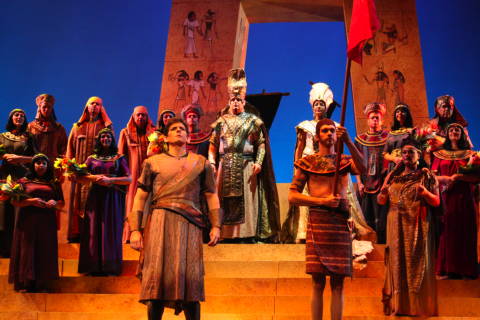
Drew Slatton as the victorious general, Radames, in Phoenix Opera's 'Aida'. Photo © 2009 Victor Massaro
|
On 30 January 2009, Phoenix Opera presented Verdi's Aida at the Orpheum Theatre. Albert Sherman, best known for his work at the New York City Opera, directed the traditional production. The set from Actor's Theatre of Phoenix, which was designed by David J Castellano, had few opportunities for any sort of real change, but Paul A Black's lighting did a great deal to vary the background with atmospheric effects.
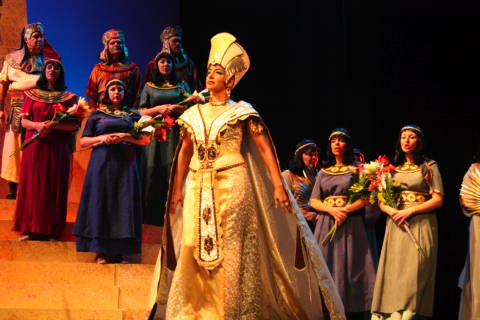
Grace Echauri as Amneris in Phoenix Opera's production of 'Aida'. Photo © 2009 Victor Massaro
|
Susan Allred's costumes, originally designed for Utah Opera, were simple, functional and appropriate. It's a long time since Arizona Opera staged this opera, but their supertitles, cued by Katherine Kozak, worked very well. Currently, Aida is often played with only one intermission but, possibly in an attempt to follow tradition, the Phoenix performance had three lengthy pauses.
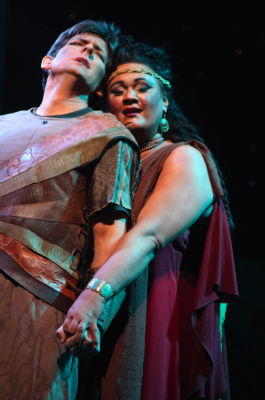
Aida (Marie-Adele McArthur) convinces Radames (Drew Slatton) to reveal state secrets in Phoenix Opera's production of 'Aida'. Photo © 2009 Victor Massaro
|
New Zealand born soprano Marie-Adele McArthur was a passionate Aida with a powerful voice that allowed her to be easily heard over chorus and orchestra. She sang the more lyrical Nile Scene with plaintive silken tones. It would have been wonderful to have heard her with the original tenor, Todd Geer. Unfortunately, he was taken ill and Drew Slatton took over the role of Radames at the last minute. Slatton proved to have blowtorch high notes but he sang most of the role forte with some lapses in intonation and almost no nuance. There seemed to be little chemistry between him and McArthur.
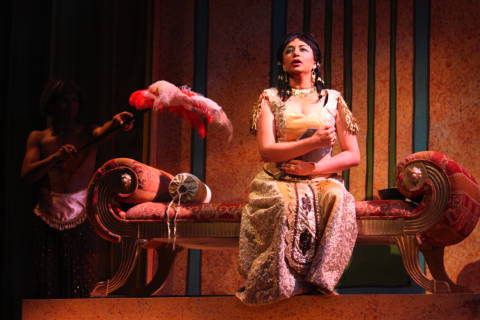
Grace Echauri as Amneris in Phoenix Opera's production of 'Aida'. Photo © 2009 Victor Massaro
|
Mexican mezzo-soprano Grace Echauri gave a lyrical rendition of the role of Amneris in which she acted with her mellifluous voice as well as with her lithe body. The combination was an enthralling version of the haughty Egyptian princess sung with an opulent musical palette. Although she did not have enormous vocal power for the Judgment Scene, she tugged at the audience's heartstrings when she pleaded for the life of a man who did not return her love.
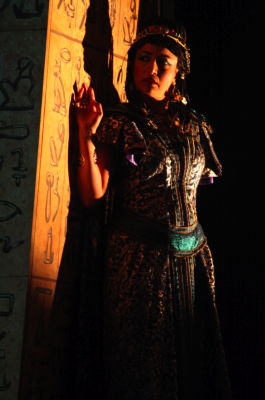
Grace Echauri as Amneris in Phoenix Opera's production of 'Aida'. Photo © 2009 Victor Massaro
|
As Aida's father, Amonasro, the King of Ethiopia, Donnie Ray Albert was the wonderful singing actor we know from his performances at other opera companies and on DVD. He was a charismatic king who commanded the stage whenever he appeared. Singing with robust and burnished tonal colors, he energized his lines with the force of his conviction. Albert is a joy to watch in any of the roles he sings.
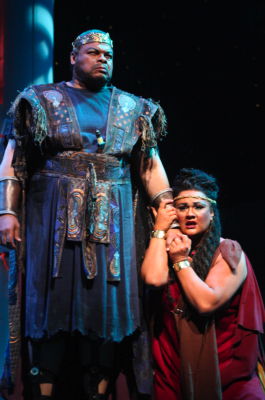
Aida (Marie-Adele McArthur) implores her father Amonasro (Donnie Ray Albert) not to make her ask Radames to be a traitor to his country. Photo © 2009 Victor Massaro
|
Veteran Russian bass Mikhail Svetlov was a credible Ramfis who sang with well-supported ringing tones and Andrew Gray was a dramatically alert King of Egypt. Francisco Renteria, the Messenger, sounded like he might go on to larger roles, while Tregoney Shepherd was a sweet sounding Priestess. Together with the chorus and supers, choreographer Lisa Starry's dancers filled the stage in the second act, but they could have performed with better synchronization. The chorus sang with full voices, however, and made up for the lack of larger forces in the Triumphal Scene.
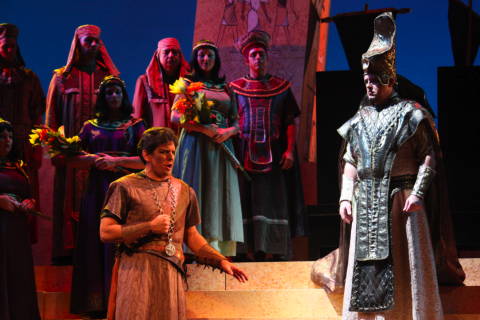
Drew Slatton as Radames and Andrew Gray as the King in Phoenix Opera's 'Aida'. Photo © 2009 Victor Massaro
|
Conductor John Massaro's orchestra was small for this opera, but each member played valiantly and the result was a thoroughly enjoyable rendition of the work. A larger orchestra and chorus would have been welcome, but Aida is a great masterpiece and the luxury of seeing it in Arizona this winter was a special treat.
Copyright © 17 February 2009
Maria Nockin, Arizona USA

|

